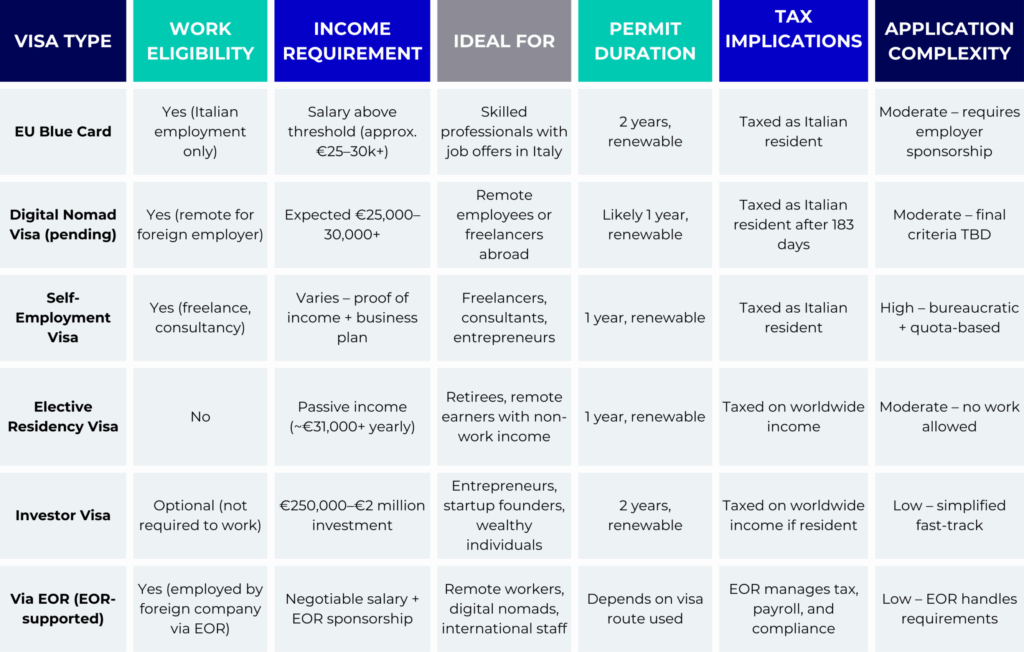23 May 2025
What are the best visa options for professionals relocating to Italy?
With its rich culture, relaxed lifestyle, and beautiful cities, Italy is increasingly appealing to professionals seeking a better work–life balance. Whether you’re a skilled employee, remote worker, or freelancer, moving to Italy opens the door to professional and personal enrichment, but only if you choose the right visa.
Italy offers multiple visa options for professionals, each with its own requirements, benefits, and restrictions. Understanding these differences is key to making a confident, informed decision. This guide compares the best visa types for skilled professionals, freelancers, and remote workers planning to live and work in Italy, and explains how an Italian Employer of Record can support legal, compliant employment, especially if you’re working for a company that doesn’t have a legal entity in Italy.
Highly skilled worker visa (EU Blue Card)
The EU Blue Card is designed for highly qualified professionals and is one of the most structured and secure visa options for working in Italy.
To be eligible, applicants must:
- Have a higher education degree or equivalent professional qualifications.
- Hold a binding job offer or work contract in Italy for at least one year.
- Meet the minimum gross salary threshold, which is updated annually (typically above €25,000–€30,000 depending on the sector).
This visa is ideal for engineers, IT specialists, healthcare professionals, and other in-demand talent. It offers a clear path to long-term residency and family reunification, with the ability to move freely within other EU countries after a period.
However, maintaining legal status under the Blue Card requires full compliance with Italian labour laws and employer responsibilities. A foreign company employing you without a registered presence in Italy can create complications unless supported by an EOR partner.
Digital nomad visa
Italy has announced plans to launch a digital nomad visa to attract remote workers, though full implementation is still pending. Early indications suggest the visa will be available to non-EU citizens who:
- Work remotely for non-Italian companies.
- Earn a minimum income (amount still to be confirmed).
- Have valid health insurance and stable accommodation in Italy.
This visa will suit remote employees and contractors who want to live in Italy without switching jobs or employers. It’s especially appealing for tech workers, consultants, or marketing professionals working fully online.
However, digital nomads should consider the implications of tax residency and social security. If you stay more than 183 days in Italy, you’ll likely become a tax resident, subject to Italian tax on global income. This is where working with an EOR can offer a compliant employment solution that handles tax and benefit registrations properly.
Self-employment visa (freelance visa)
Italy’s self-employment visa is an option for freelancers, consultants, and solo entrepreneurs who plan to offer services in Italy. Commonly referred to as the “freelance visa,” this route requires:
- A viable business plan.
- Evidence of sufficient income and savings.
- Authorisation from the local Chamber of Commerce.
- A place of residence and health insurance.
While it offers more independence and flexibility, it comes with administrative hurdles and limited annual quotas. The application process can take months and requires navigating Italian bureaucracy, including applying for a specific nulla osta (work authorisation).
It’s best suited to seasoned freelancers already familiar with European tax systems and regulations, or those willing to hire legal support in Italy. However, if you want the freedom of freelancing with the protections of employment, an EOR model may offer a simpler alternative.
Elective residency visa (non-lucrative visa)
The elective residency visa is designed for individuals who want to live in Italy without working. It’s ideal for retirees, investors, or financially independent professionals who have steady passive income from abroad.
To qualify, you must:
- Demonstrate sufficient passive income (typically above €31,000/year for individuals).
- Provide proof of accommodation in Italy.
- Hold comprehensive private health insurance.
The biggest restriction? You cannot work under this visa, even remotely for a foreign company. Many digital nomads mistakenly assume this visa is suitable, but doing any work while holding an elective residency visa can violate its terms and lead to penalties or visa cancellation.
If you plan to work while living in Italy, even for a foreign employer, you’ll need to explore other options such as the digital nomad visa or work with a compliant EOR solution.
Italy’s investor visa (Golden Visa)
For professionals with capital to invest, the Italy Investor Visa, often called the “Golden Visa”, offers a route to residency without requiring employment. To qualify, you must make one of the following investments:
- €250,000 in an Italian startup,
- €500,000 in an established Italian company,
- €2 million in Italian government bonds,
- €1 million as a philanthropic donation to a cultural or scientific initiative.
This visa is ideal for entrepreneurs, startup founders, and investors who want to establish business interests in Italy while securing a residence permit. It comes with fewer day-to-day compliance obligations but does require substantiating your investment and maintaining it over the permitted residency period.
How to choose the right visa for your situation
The table below compares Italy’s professional visa options, including employment eligibility, income requirements, tax impact, and application complexity. It’s designed to help you quickly identify which visa best suits your work status, whether you’re a skilled employee, freelancer, investor, or remote worker.


The right visa depends on your employment status, income source, work plans, and family goals. For example:
- A software engineer with a job offer in Milan from a local employer may opt for the EU Blue Card.
- A US-based graphic designer working remotely might consider the digital nomad visa (once available) or use an EOR to ensure local compliance.
- A freelance consultant wanting to work with Italian clients could apply for the self-employment visa.
- An investor looking to base themselves in Rome and support local innovation may choose the Golden Visa.
- A financially independent expat planning to retire in Tuscany would likely be best suited for the elective residency visa.
How an Italian Employer of Record (EOR) supports professional relocation
For many professionals, especially remote workers and employees of non-Italian companies, the biggest challenge is maintaining legal employment status and staying compliant with Italian labour and tax laws. This is where a local Employer of Record (EOR) becomes invaluable.
An EOR acts as your legal employer in Italy while your actual employer (often a foreign company) retains control over your job duties and salary negotiation. The EOR ensures that your work is registered properly, taxes are paid, and all legal obligations are met.
What an Italian EOR can do:
- Provide a compliant local employment contract, allowing you to legally live and work in Italy.
- Handle payroll, tax withholding, and social security contributions on your behalf.
- Ensure you receive all statutory benefits, including health insurance, paid leave, and pension contributions.
- Offer guidance on visa sponsorship or relocation paperwork if needed.
For example, an Australian entrepreneur obtained Italy’s Golden Visa by investing in a local startup but still wanted to work remotely for his company based abroad. Since the Golden Visa doesn’t automatically provide a structured employment setup, he partnered with an Italian Employer of Record (EOR) to issue a compliant local contract.
The EOR handled his payroll, social security registration, and tax compliance, ensuring he could legally live in Italy under the investor visa while continuing to work for his international business.
This is especially helpful for:
- Digital nomads who want to live in Italy long-term and maintain their job abroad.
- Freelancers who want employee protections without forming a local company.
- Businesses relocating global staff to Italy without setting up a branch or subsidiary.
Choose your visa: we can help
Italy offers a variety of visa options for professionals, from the structured EU Blue Card to the flexible but complex self-employment visa, and the upcoming digital nomad visa designed for remote workers. Each comes with its own requirements, benefits, and restrictions, and choosing the wrong one can limit your ability to work or access essential services.
Whether you’re moving for lifestyle, work opportunities, or a mix of both, understanding these visa options is the first step toward a smooth relocation.
Considering a move to Italy but unsure how to work legally for your employer? Contact us to learn how our Italian Employer of Record solution can help you relocate, work, and stay fully compliant.
